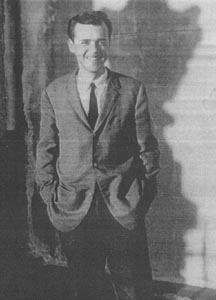Robert Quine

Portrait of the artist as a young man
Tribute by Efrén del Valle
Robert Quine left. You may call me na´ve, but I expected to spot some obituaries in the Spanish newspapers the day after. Or perhaps a week later, at least a brief one. Nothing. Now, thinking of Quine's career in retrospect, that should come as no surprise. Tackled with the perspective of time, his powerful guitar playing was that of a force in the shadow, keeping a seemingly voluntary low profile since the days he participated in the Voidoids' seminal "Blank Generation," a watershed recording that remains a relatively hidden treasure for the stubborn enough to believe that punk-rock begun and ended with the Sex Pistols. And why not say it, his input was apparently scarce and economic, to say the least. If we were to gather the soloing time of Quine's entire career, we would probably be left with only a few minutes. However, I would humbly suggest the attentive listener to sit down and rescue those priceless moments, for they stand as some of the most incissive, intelligent and abrassive guitar abuses you have likely heard in rock's recent history: listen to Richard Hell's "Love Comes in Spurts" (Blank Generation, 1977) for a burst of immediacy; Lou Reed's "Waves of Fear" (The Blue Mask, 1982) for a taste of creepiness and a twisted, minimal and effectist approach to guitar; John Zorn's wonderfully mishmashed Filmworks series for an overview of Quine's stylings (I would clearly suggest Volumes III, V and VII on Tzadik) and "Two Lane Highway" (Spillane, 1987) for an abstract blues mood along with the legendary Albert Collins; or "Mojave" (Painted Desert, 1997) for a sedative, twangy interwining with fellow guitarist Marc Ribot. I know that is only the tip of the iceberg, but as far as tips go, these are overwhelming.Quine's protagonism was generally reduced to 15-second blasts, magnificient creations in themselves, avoiding exhibitionism like the plague and oozing an uncomparable sense of authenticity. Although it may seem obvious, he not only was a musician, but also a restless fan, an obsessive beholder, thus embarking in the not-so-usual quest of permanent learning. Reading one of his few published interviews opens a neverending field of name references, some long-forgotten, some frequently overlooked. Ritchie Valens, Ike Turner, Hank Marvin often turned up in his statements. Equally reverential to his heroes and bitterly ironic to his "musical antagonists", he did not hesitate to use the "shit" qualifier whenever he thought it applied.
Robert Quine could be considered the most unpretentious of guitarists. Although most often he was granted the lead role, he seemed to abhor the preconceived notions of such a position. He seemed to contemplate music through a different glass, a strangely pure one. Despite his being an irrefutable genius of his instrument, I am not really sure that his outstanding alliances with musical luminaries like Reed, Zorn or Waits did him justice in the end. There is an enviable talent in all of those recordings, but I am left with the feeling that Robert Quine's story still remains untold. He will be missed. He is missed.